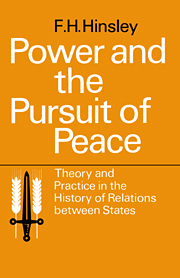Book contents
- Frontmatter
- Contents
- INTRODUCTION
- PART I A HISTORY OF INTERNATIONALIST THEORIES
- 1 To the End of the Seventeenth Century
- 2 Penn, Bellers and Saint-Pierre
- 3 Rousseau
- 4 Kant
- 5 Bentham and James Mill
- 6 The First Half of the Nineteenth Century
- 7 From the Crimean War to the League of Nations
- PART II A HISTORY OF THE MODERN STATES' SYSTEM TO 1900
- PART III INTERNATIONAL RELATIONS AND INTERNATIONAL ORGANIZATIONS IN THE TWENTIETH CENTURY
- References
- Index
- Frontmatter
- Contents
- INTRODUCTION
- PART I A HISTORY OF INTERNATIONALIST THEORIES
- 1 To the End of the Seventeenth Century
- 2 Penn, Bellers and Saint-Pierre
- 3 Rousseau
- 4 Kant
- 5 Bentham and James Mill
- 6 The First Half of the Nineteenth Century
- 7 From the Crimean War to the League of Nations
- PART II A HISTORY OF THE MODERN STATES' SYSTEM TO 1900
- PART III INTERNATIONAL RELATIONS AND INTERNATIONAL ORGANIZATIONS IN THE TWENTIETH CENTURY
- References
- Index
Summary
Rousseau's political philosophy was for long misunderstood. People believed that he sang the praises of the noble savage, deplored the advent of political society, when the opinion from which he never wavered―except in his juvenile writings―was that political society was the moralising agency as well as the degrading force in men's lives. His ‘individualism’ is now seen to have been little more than a myth but his views on perpetual peace are still widely misinterpreted. Everybody knows that he wrote two separate treatises on the subject in the same year; not many people have attempted to explain the apparently glaring contradictions they contain, or have remembered that he wrote much else that helps to explain them.
The first of the two treatises, the Extrait du Projet de Paix Perpétuelle de Monsieur l' Abbé de Saint-Pierre, written in 1756 and published in 1761, was a work of piety. Except for one other short piece, it was the sole result of his plan to edit and republish all the voluminous writings of Saint-Pierre, whom he had known. The second was the Jugement sur la Paix Perpétuelle: also written in 1756 but not published till 1782. Rousseau added to the Extrait an historical introduction and comments of his own, and altered other details.
- Type
- Chapter
- Information
- Power and the Pursuit of Peace: Theory and Practice in the History of Relations Between States , pp. 46 - 61Publisher: Cambridge University PressPrint publication year: 1962



